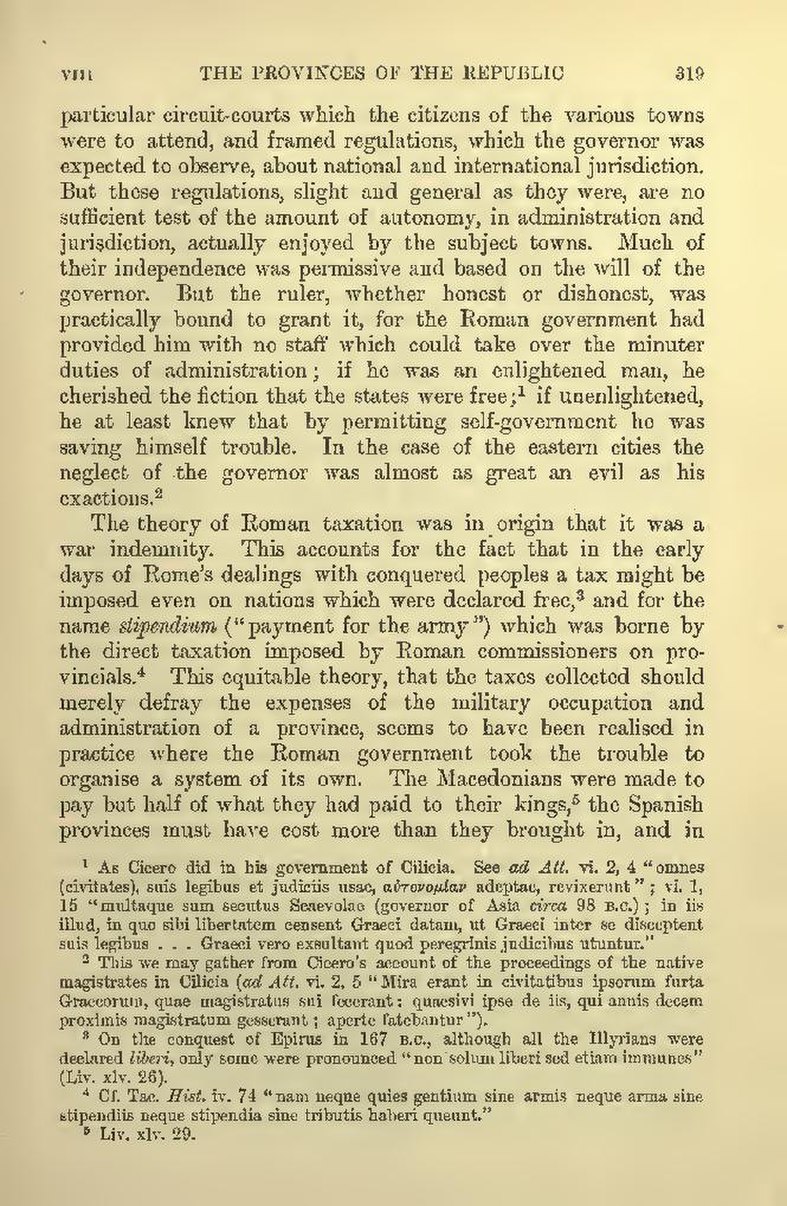particular circuit-courts which the citizens of the various towns were to attend, and framed regulations, which the governor was expected to observe, about national and international jurisdiction. But these regulations, slight and general as they were, are no sufficient test of the amount of autonomy, in administration and jurisdiction, actually enjoyed by the subject towns. Much of their independence was permissive and based on the will of the governor. But the ruler, whether honest or dishonest, was practically bound to grant it, for the Roman government had provided him with no staff which could take over the minuter duties of administration; if he was an enlightened man, he cherished the fiction that the states were free;[1] if unenlightened, he at least knew that by permitting self-government he was saving himself trouble. In the case of the eastern cities the neglect of the governor was almost as great an evil as his exactions.[2]
The theory of Roman taxation was in origin that it was a war indemnity. This accounts for the fact that in the early days of Rome's dealings with conquered peoples a tax might be imposed even on nations which were declared free,[3] and for the name stipendium ("payment for the army") which was borne by the direct taxation imposed by Roman commissioners on provincials.[4] This equitable theory, that the taxes collected should merely defray the expenses of the military occupation and administration of a province, seems to have been realised in practice where the Roman government took the trouble to organise a system of its own. The Macedonians were made to pay but half of what they had paid to their kings,[5] the Spanish provinces must have cost more than they brought in, and inadeptae, revixerunt"; vi. 1, 15 "multaque sum secutus Scaevolae (governor of Asia circa 98 B.C.); in iis illud, in quo sibi libertatem censent Graeci datam, ut Graeci inter se disceptent suis legibus . . . Graeci vero exsultant quod peregrinis judicibus utuntur."]
- ↑ As Cicero did in his government of Cilicia. See ad Att. vi. 2, 4 "omnes (civitates), suis legibus et judiciis usae, [Greek: autonomian
- ↑ This we may gather from Cicero's account of the proceedings of the native magistrates in Cilicia (ad Att. vi. 2, 5 "Mira erant in civitatibus ipsorum furta Graecorum, quae magistratus sui fecerant: quaesivi ipse de iis, qui annis decem proximis magistratum gesserant; aperte fatebantur").
- ↑ On the conquest of Epirus in 167 B.C., although all the Illyrians were declared liberi, only some were pronounced "non solum liberi sed etiam immunes" (Liv. xlv. 26).
- ↑ Cf. Tac. Hist. iv. 74 "nam neque quies gentium sine armis neque arma sine stipendiis neque stipendia sine tributis haberi queunt."
- ↑ Liv. xlv. 29.
